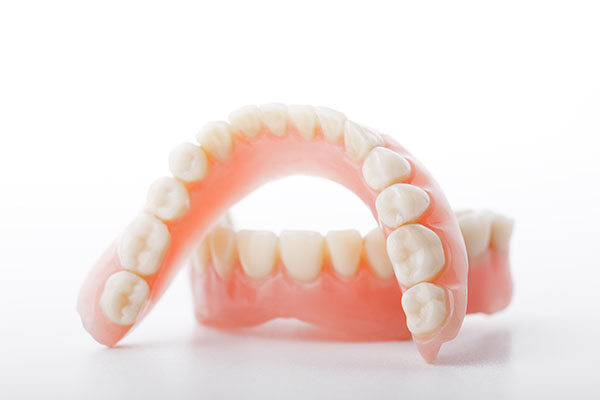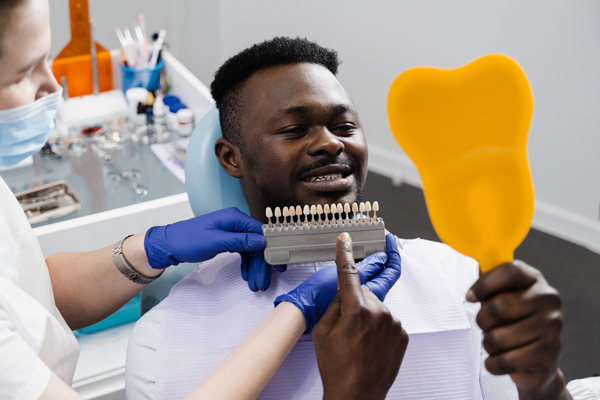What to Expect When Getting Dentures
 Getting new dentures, partial or full, are a way for many people to get back the full functionality of their mouth. A denture consists of replacement teeth which are attached to a plastic gum-colored, or traditionally pink, base. The dentist will examine you and help you decide what kind of attachments best suit your needs. There are two types of attachments, or ways your dentures can be inserted into your mouth. Most people have metal framework and clasps that connect to their teeth. The denture is then inserted into the mouth and “hooked” into place. A slightly different way of attaching dentures is to use a precision attachment. Precision attachments are typically more esthetically pleasing than clasps.
Getting new dentures, partial or full, are a way for many people to get back the full functionality of their mouth. A denture consists of replacement teeth which are attached to a plastic gum-colored, or traditionally pink, base. The dentist will examine you and help you decide what kind of attachments best suit your needs. There are two types of attachments, or ways your dentures can be inserted into your mouth. Most people have metal framework and clasps that connect to their teeth. The denture is then inserted into the mouth and “hooked” into place. A slightly different way of attaching dentures is to use a precision attachment. Precision attachments are typically more esthetically pleasing than clasps.
Most people have very little understanding of what to expect when they get dentures made. A good dentist will sit down and go over all the steps, explain all the processes involved, some of what to expect, and how to maintain your dentures once you have left the dentist's office. If you have dentures and have specific questions, calling the dentist and discussing them is always the best option. Here are a few things that you can expect after having dentures put in.
For the first several days and longer for some patients, the dentures will feel extremely unnatural, bulky and foreign in your mouth. This is because your mouth has not gotten used to the idea of having something in your mouth, and you have not yet transitioned to the dentures feeling like an extension of your teeth. Eventually, however, the feeling of newness and bulkiness will wear off, and the dentures will start to feel comfortable.
The dentist will give you specific advice on how long the dentures need to be worn and, equally importantly, when they should be removed. In the beginning, while you are getting used to the process, the dentures will feel awkward and you may find it hard to insert and remove the dentures. Following all the instructions your dentist provides is important they can prevent the dentures from becoming bent or damaged. Remember that the denture should fit into your mouth with relative ease, and if you find yourself having to force it, something is probably not right. Biting down or forcing the dentures is a bad idea as this could lead to the clasps bending or breaking.
Eating will become easier with the dentures. At first, however, since you are not used to working with them it can be harder. It is advisable to cut food down into smaller pieces at first. Avoiding excessively hard foods or foods that are extremely sticky is a good idea, and you should probably rule out chewing gum for a while. Once you have made the adjustment and the dentures feel normal, and you can chew like normal, it is time to experiment with more difficult foods to see how you do.
Speaking also becomes easier with dentures. Some patients find that they have to practice enunciating certain words after having their dentures inserted. Practice more difficult words and try to read aloud to speed up the process of your mouth getting used to speaking with the dentures inserted.
Finally, remember that there is such a thing as being too handy. Using a do it yourself kit to repair your dentures, or attempting to bend them to better fit your mouth could result in a break and needing a costly replacement. Always seek out the advice of your dentist if you need a replacement, adjustment, or refitting of your dentures.
Recent Posts
Learning more about your options for getting new dentures is necessary, as you need to make a choice that works for you. This requires thinking about your current lifestyle and how denture care will fit in. Denture care is very important, as when you take proper care of your dentures, they can last many years.Finding…
For many people, dentures help patients eat, speak and live life more confidently than without dentures. If you have dentures, you already know the difference they make in your quality of life, so it only makes sense to take extra good care of them. However, over time, dentures may become damaged. Eventually, your dentures will…
If you are looking for dentures, it is essential to know how to care for them properly. They can be expensive, and not everyone has the budget to keep them fresh with regular visits to the dentist.Learning about denture hygiene will help ensure that they stay clean and comfortable while fighting plaque buildup and tartar…
Dentures are removable, custom-made replacements for lost teeth. If you want your dentures to last for a long time, it is crucial to take care of them. This will help you to avoid a wide range of issues. Keep reading to find out more about proper denture care.There are different types of dentures that are…
 Getting new
Getting new 
